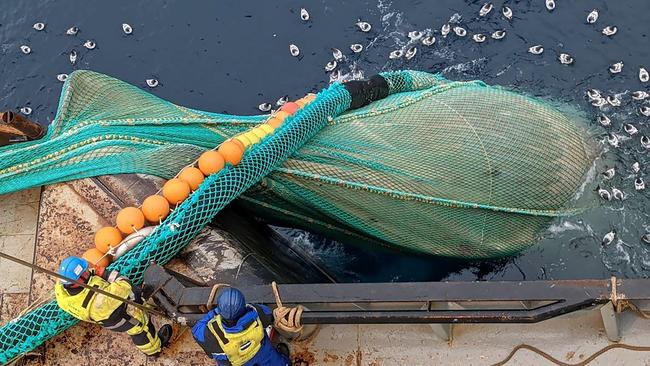Whale fatalities a by-product of increased krill fishing
The concentration of krill fishing in parts of Antarctica is being blamed for a shocking new phenomenon: humpback whales as bycatch.

A concentration of krill fishing in parts of Antarctica is being blamed for a new phenomenon: humpback whales as by-catch.
A global summit of Antarctic nations will next week hear at least four juvenile humpbacks have been caught in krill fishing nets since early 2021 – the first recorded.
Conservationists blame a concentration of krill fishing in several key whale feeding areas in recent years, and are demanding immediate curbs on the burgeoning industry.
“This is evidence there is overlap of where the whales are feeding and where krill fishers are setting nets,” said Emily Grilly, WWF Antarctic conservation manager. “This is a new issue and something that definitely needs to be addressed this year. These animals that depend on krill are facing more competition for their food source.”
An International Whaling Commission report says it is the first time whales were recorded as by-catch by krill trawlers.
The incidents – three in 2021 and another in January 2022 – are understood to have occurred in areas near the Antarctic Peninsula, where krill fishing has become intensely concentrated.
IWC says it is “impossible to determine” if the whales were already dead or drowned while entangled in the nets, although the most recent incident was reported as a drowning from entanglement.
Experts say it is likely the whales were killed in the nets, as dead whales are more likely to float to the surface or sink to the bottom of the ocean than to remain at midwater depths where trawling occurs.
Conservationists want measures to disperse the harvest and say the incidents, and a new report highlighting the role krill play in sequestering carbon, support a push by Australia and other nations for new Antarctic marine protected areas.
Regulation of krill fishing will be a key issue at a meeting of the 26-nation Commission for the Conservation of Antarctic Marine Living Resources in Hobart from next week. “There’re real issues with the spatial concentration of krill fishing around the Antarctic Peninsula and the Scotia Sea area,” Ms Grilly said. “The majority of the catch is being taken from these small, near-shore areas that they return to every single year.
“We’re hoping to see no increase in the catch limits. We want to see a new management framework that spatially distributes fishing operations, evidence that this framework is going to protect predators, and strong measures to prevent by-catch.”
These could include “move on” provisions to require krill fishers to leave areas where whales are feeding, as well as more on-board observers.
The Association of Responsible Krill Harvesting Companies said the industry was “very concerned” about the whale by-catch but believed placing a mesh at the mouth of the trawl nets would prevent further incidents as it would be “impossible for any whale to get into the trawl net,” association executive officer Javier Arata said. “The net mesh is in line with the recommendation of IWC... Work between scientists and the industry will help to minimise future interactions between the fishery and whales.”
A new WWF report suggests Antarctic krill effectively store 23 megatonnes of carbon each year, a “service” the expert report values at $15.2bn a year. Ms Grilly said this compared to a krill fishing industry worth $250m a year.




To join the conversation, please log in. Don't have an account? Register
Join the conversation, you are commenting as Logout